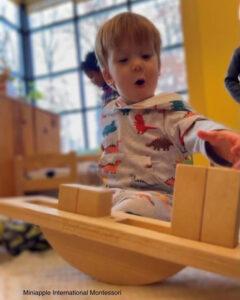
The Montessori method views play as a child’s work, promoting self-directed and collaborative play in a supportive environment. The classroom design links children’s natural interests to available activities, fostering curiosity and building a lasting foundation for lifelong learning. Here is a quick guide to Montessori play.
Why Does Montessori Call Play Work?
Montessori education views play as essential to a child’s development and learning process. It refers to it as work because it represents a child’s natural and purposeful way of engaging with the world. This term is not meant to diminish the joy and spontaneity of play but rather to highlight its significance in a child’s cognitive, emotional, and social growth.
In Montessori philosophy, children are seen as active participants in their learning and possess an intrinsic drive to explore and understand the world around them. For young children, play is self-directed learning driven by their natural curiosity and desire to master their environment. Children develop various skills through play, such as problem-solving, social interaction, communication, creativity, and emotional regulation.
Montessori educators emphasize that play should not be seen as mere entertainment but as a meaningful and purposeful activity. Play enables children to develop concentration and focus, which are crucial for future academic success. It encourages them to build independence and self-confidence as they engage in activities of their own choice.
By providing a prepared environment with developmentally appropriate materials and activities, Montessori allows children to learn through exploration and self-discovery, enhancing their innate love for learning.
What is Open-Ended Play?
Open-ended play is a fundamental concept in Montessori education that emphasizes providing children with opportunities to explore, create, and learn through open-ended and unstructured activities. It is rooted in the belief that children are naturally curious and have an innate drive to learn through self-discovery and independent exploration.
In an open-ended play environment, children are encouraged to interact with their surroundings and materials without rigid guidelines or predefined outcomes, fostering creativity, problem-solving skills, and a sense of agency.
In the Montessori classroom, teachers carefully curate a range of age-appropriate materials designed to be versatile and adaptable to various play scenarios. These materials are intentionally chosen to cater to a child’s developmental stage and allow them to engage in tasks at their own pace and interest level. By offering activities with endless possibilities, children can explore their imaginations, experiment with different solutions, and develop a deeper understanding of the world around them.
Open-ended play also promotes the development of vital social skills. In a mixed-age Montessori setting, older children often serve as mentors, inspiring and guiding their younger peers through their play experiences. This collaborative environment nurtures empathy, communication, and cooperation, promoting community and mutual respect.
Through open-ended play, Montessori education aims to foster a lifelong love for learning, instilling in children the confidence to take risks, embrace challenges, and discover their strengths and interests.
What Is a Montessori Toy?
One of the essential aspects of Montessori toys is their focus on simplicity and natural materials. These toys often feature wood, fabric, metal, and sometimes natural fibers, avoiding plastic and electronic components. The aim is to connect children with the natural world and engage their senses tactilely.
Another key feature of Montessori toys is their ability to support open-ended play. These toys do not have a fixed purpose; instead, they allow children to use their creativity and imagination to explore various possibilities. Open-ended toys promote problem-solving skills, critical thinking, and cognitive development.
Montessori toys include simple puzzles, building blocks, threading beads, stacking toys, sensory materials like sandpaper letters, and other manipulative activities. These toys entertain and serve as powerful learning tools that support a child’s physical, cognitive, emotional, and social development.
As a parent, you likely want your children to achieve their dreams with a successful education and career. Start early with Miniapple International Montessori School, offering astounding educational opportunities for children of all ages. Contact us to get started.

